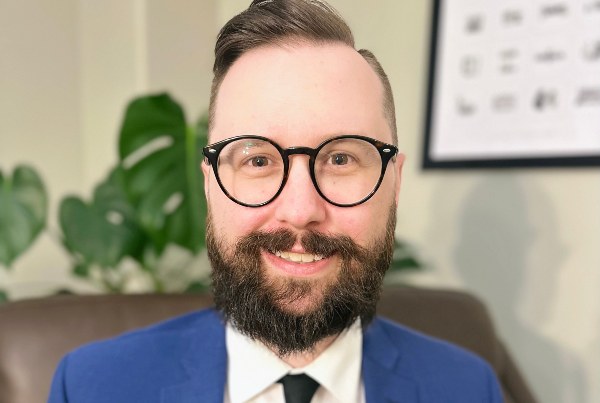
Public policy and nuclear power: How a research assistantship and thesis project set Tyler Koebel up for success
There aren’t many people in the world who go from studying philosophy to working as a nuclear energy policy advisor. But for Tyler Koebel, his journey through the Johnson Shoyama Graduate School of Public Policy (JSGS) gave him the chance to explore his interests — and turn them into a career — in unique ways.
By Matt Olson for JSGS“I knew I wanted to do a public policy-type program,” he said. “The reason I ended up choosing JSGS was a professor who said ‘if you come here we can provide you with research opportunities in an area of your interest.’ I was ecstatic about that.”
Koebel’s initial interests were a far sight from public policy. He studied psychology and sociology at Lethbridge College and philosophy at the University of Lethbridge, and was deeply fascinated by behavioural economics.
When he identified JSGS as the institution to pursue his Master of Public Policy (MPP), he reached out for job opportunities. He was connected with Dr. Jeremy Rayner (PhD) at JSGS to work as a research assistant examining policy and regulations around small modular nuclear reactors.
Koebel admitted that initially he was “quite opposed” to nuclear energy — but after doing some of his own research and realizing he held unfounded beliefs about the technology, he decided to take the position.
“It was an insightful introduction into an energy policy space from an academic lens,” he said.
Between dabbling in nuclear policy and his personal interest in behavioural economics, Koebel said reflections on his own biases when it came to nuclear technology led to the realization that pursuing a thesis project combining his work as a research assistant and his own areas of interest was an exciting option.
Koebel’s thesis examined the public’s perceptions of risk when it comes to controversial technologies — focusing on nuclear energy technology.
“In the realm of contentious technologies with deeply polarized views on technologies, people don’t behave in ways you’d expect,” Koebel said. “They behave less like impartial evaluators of evidence and more like sports fans … they’ll support their team no matter what.”
Koebel called it “motivated reasoning,” wherein people will look at the same technology in a biased way that supports the conclusion they already have in mind.
So for Koebel, a challenge came to the forefront: broaching topics of contentious technology to those who don’t want to — or refuse to — consider different viewpoints. He admitted it’s not a simple task, which makes the work that much more interesting.
“How is it, if at all, a person can communicate information on a polarized topic in a way that gives facts a fighting chance?” Koebel said.
Koebel never expected for his career path to evolve the way it has. The original plan, he said, was to explore government work for a couple of years and then pursue a PhD.
But being able to directly work in policy, first with various provincial and territorial governments and then directly in the field of nuclear energy policy withthe federal government, was too exciting and too important to leave behind.
“Once I was in government and I could see how my writing, research, and the work I’m doing actually has an impact on people's lives and livelihoods, it gave me a buzz,” he said. “I’m happy with my career choice and the ability to inform decision-makers.”
Coming out of the MPP program at JSGS, Koebel said the job market was fierce and he applied to many different positions. Eventually he found an internship with the provincial government in British Columbia, and then eventually to his position with NRCan.
Koebel said his master’s degree from JSGS unequivocally helped get him his first job in government — and his unique research background and coursework helped take him the rest of the way.
“The experience I had at (JSGS) gave me a leg up in the competition for all my roles. In my current role, I’m one of a few people in Canada who had nuclear energy policy experience” he said. “Having that knowledge was rare and highly sought after.”
Koebel was highly complimentary of his time at JSGS, applauding both the high caliber and accessibility of his instructors. He also noted that numerous opportunities were made available to him — chances he may not have had at a larger school.
A smaller cohort of students, a dedicated thesis supervisor, and excellent faculty are all things Koebel said were highlights from the MPP program. Prospective students have asked Koebel for advice about the JSGS program. He said it’s a great program, and the benefits can take you unexpected places.
“You don’t really know where you’ll end up. I didn’t expect to live and work in Victoria or Edmonton or Yellowknife, or that I’d find myself back in Saskatoon. Opportunities will present themselves,” he said. “The biggest takeaway for me, from having this MPP degree, is that it gave me a broad skill set where I have the tools and confidence to go work in any level of government and excel.”

